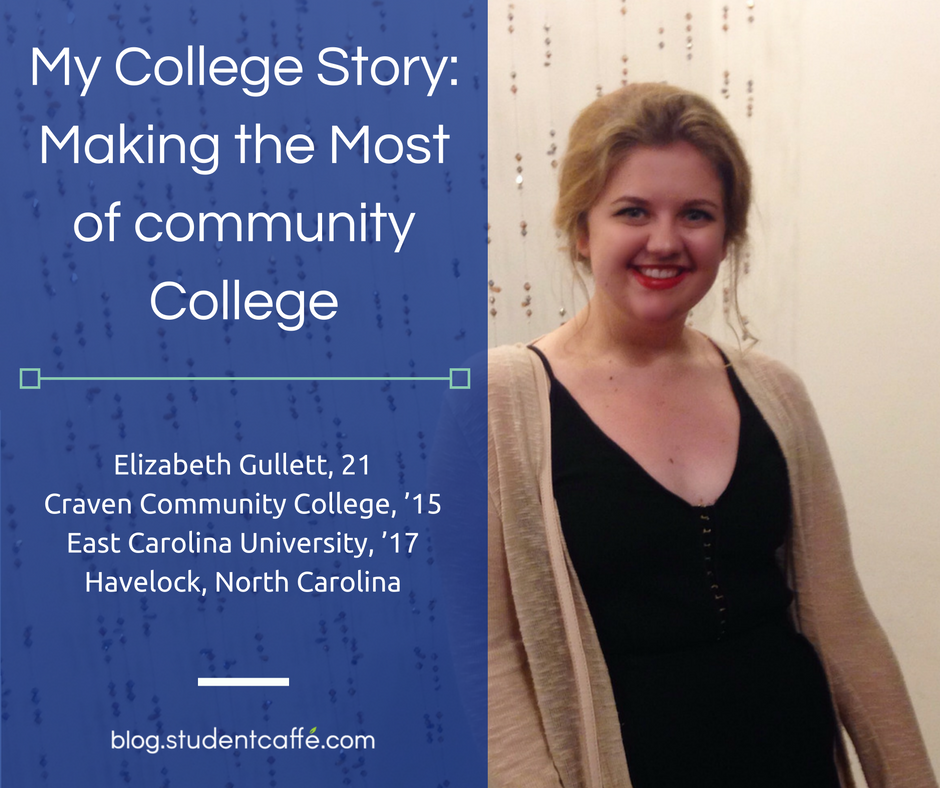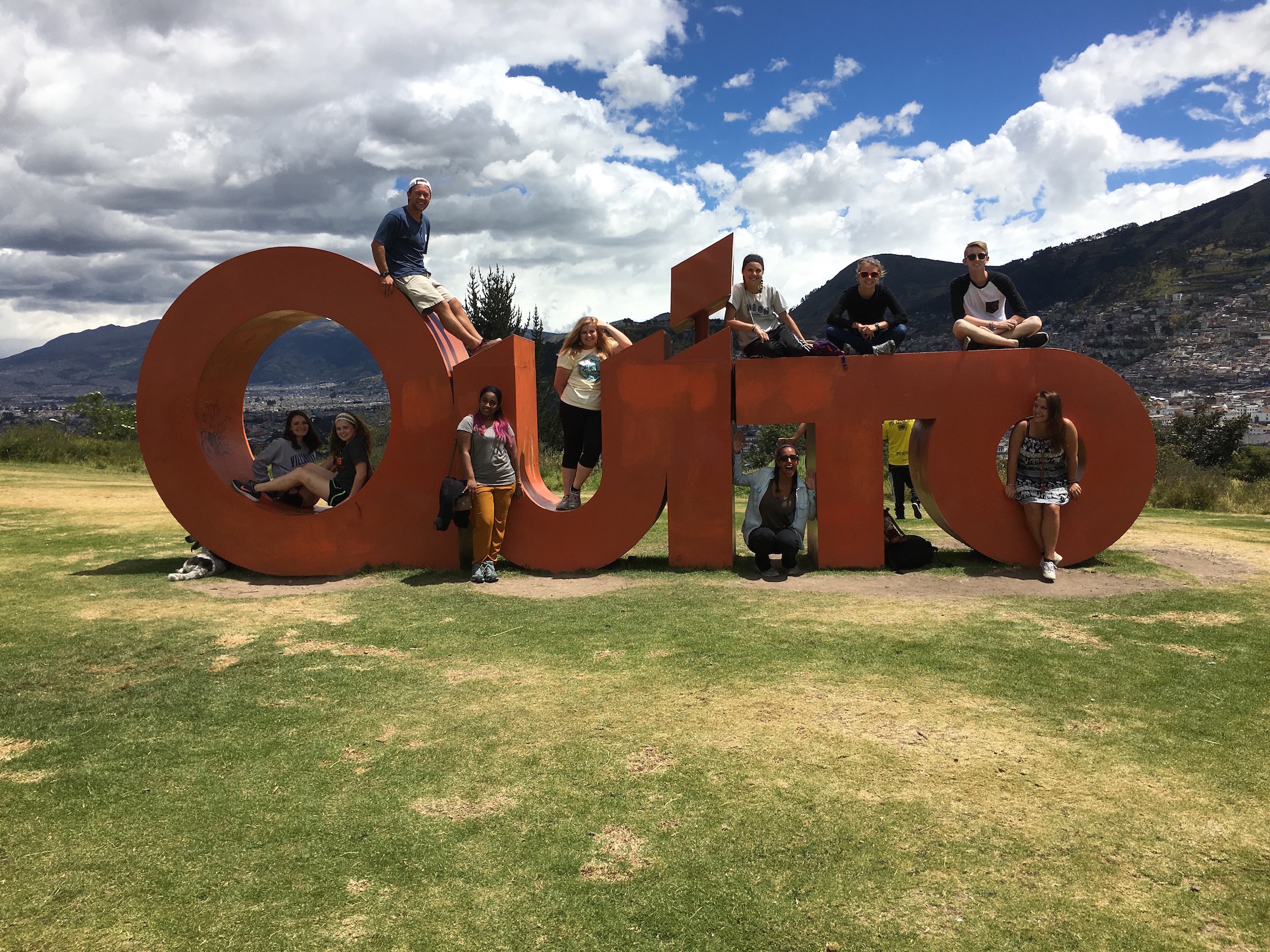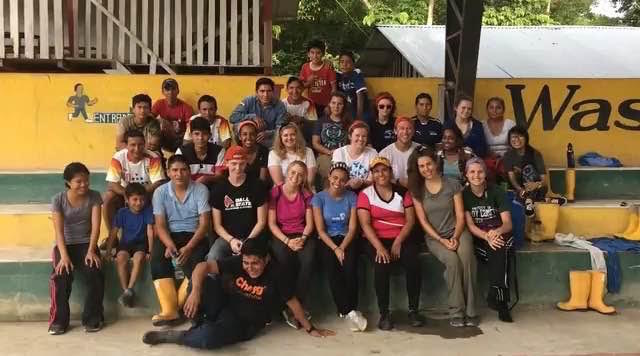
(Elizabeth Gullett)
Elizabeth Gullett, like many other students, first decided on a reach school that was highly ranked and expensive. And she got in. Her plans took a different turn, however, when she had to make her final decision. In the end, she let go of her hopes to enroll at the well-renowned Sarah Lawrence College to instead attain her associate’s degree from Craven Community College.
Though she graduated in 2015 and has since enrolled at East Carolina University to continue her education in English, she has maintained her ties with Craven, where she works as a tutor for other students. She also recently won a trip to Ecuador through the Chegg Foundation and MeToWe’s #GiveBackAndGo contest. Community college has had a positive influence on her academic career, so she encourages students to take advantage of the many doors it can open!
Q. Community college was not your first choice, so why did you choose it over your acceptance to Sarah Lawrence?
I was the first person in my immediate family to go to university, so I didn’t really have any guidance when it came to college selection. I chose to apply to a school that was out of state and way out of my price range. Factoring in tuition, room and board, books, meal plans, and fees, I would be spending approximately $70,000 a year. By the time I realized I couldn’t afford to go to Sarah Lawrence, it was too late to apply anywhere else, and I had no backup plan. Community college was my only option, and although I was not happy about going there initially, I realize now that it was a great opportunity.
Q. How did first achieving your associate’s degree help you move forward into your current studies focusing on English and linguistics?

Elizabeth Gullett and two friends (Elizabeth Gullett)
When I started my freshman year of college, I was convinced I was going to be a premed major. It only took me two semesters’ worth of math and science classes to realize that was not the right path for me. Luckily, the first two years of college courses are usually all of those general education classes, so it wasn’t a big deal for me to switch my major over to something I actually enjoyed: English. I honestly think that is the main advantage of a community college. A startling number of students change their majors once they enter college, and that can sometimes be a stressful and expensive experience. However, a community college acts almost like a buffer; it gives students a few extra years to try out courses and figure out what they want to do with their lives, all for a fraction of the cost.
Q. You tutor other students at Craven Community College. Do you think helping them has helped you? If so, how?
Absolutely! For starters, tutoring in English has given me constant practice with memorizing the rules of grammar and mechanics, so I feel like the papers I am writing have improved in that sense. Also, a large part of the tutoring that I do stems from good student practices. The small things, like referring back to the syllabus, taking notes, doing the assigned readings, etc., help immensely when it comes to doing assignments, and the act of constantly reminding students to do those things has in turn helped me do them as well. I can definitely say I am a much better student now that I am a tutor! However, I think the act of communicating with the students has taught me the most. It can sometimes be difficult to explain something to a student that has no idea what I’m talking about, but doing so has made me more patient and a better listener, both of which are useful skills to have.
Q. What is one of the most common concerns that students seem to have when they first come to tutoring?
Because I work at a community college, I have a more diverse selection of students than one would see at a traditional university. I tutor students who are returning to school after 20 years, students who have children who are also in college, students who visit me during their lunch breaks because they are trying to attend school while working a full-time job—it’s definitely not just traditional first-year college students. Ironically enough, they all generally share the same concerns despite their differences. They struggle with balancing schoolwork and jobs or other activities, they worry about falling behind in their classes, they are afraid of what to do after college, etc. However, the biggest concern that I hear is actually about coming in for tutoring. For whatever reason, there is a stigma surrounding tutoring. People are so ashamed to admit that they need help that they would quite literally rather just fail a class, and it’s ridiculous! That’s why we always let the student know that they are doing the right thing by coming to us. We assure them that they are not “stupid” because they need tutoring—they are in fact very wise to seek us out.
Q. Do you notice a similar stigma surrounding community college? If so, how do you think we can change the stigma?

Chegg interns in Quinto, Ecuador (Elizabeth Gullet)
Definitely, and I can say that from experience. I was so embarrassed to tell people that I was going to be attending community college because I hated seeing the looks of pity and disappointment on their faces. People seem to think that community college is only for losers that couldn’t get into “real college,” but that couldn’t be further from the truth! It is an excellent opportunity to take the same exact core classes as university students, but with a much smaller class size and for a much lower price. I often talk with students that attended university right from the start, and many of them actually wish they had attended community college first! I think the first step in changing the stigma is for students to not be ashamed by the choice to attend community college. Once we have students that are proud of their decisions and are actively achieving their academic goals, the minds of others will start to change as well.
Q. It seems that community college was just a small start for you. Since then, you’ve not only helped other students, but you’ve traveled the world helping people. Can you tell us about your trip to Ecuador with the Chegg Foundation?
I was recently chosen to be a Chegg intern and travel with them to Ecuador for a service trip. The trip was provided by the Chegg Foundation, and they partnered with Me to We for us to work on a water sanitation project in the Los Rios community in the Amazon rainforest. At least half of each day was spent in the community, and we would shovel gravel, mix cement, transport rocks, and lay the foundation for the water reservoir. It was an incredibly laborious job, but all of us were so thrilled to help out this community. We also had activities to educate us about the culture and life in the Amazon, so we visited local farmers and a healer, played soccer with the community members, visited artisans and a health clinic in the surrounding communities, and participated in both a day hike and a night hike. Being there was truly the most incredible experience.
Q. How did you hear about the contest and decide to pursue a chance to win?

Chegg interns in Los Rios with community members (Elizabeth Gullett)
I buy most of my college textbooks from Chegg, so I receive emails from them periodically. I noticed in one of them that they were holding a contest to become an intern and travel to Ecuador, and I thought, “Why not?” I honestly didn’t expect anything to come of it, but a few months later, I received an email telling me I was a semifinalist. From that point on, I just had a really good feeling about it all, and in the end, I was selected as one of 10 lucky individuals!
Q. Do you feel that college is what you make of it? What advice would you give to other students trying to expand their college experiences?
Most definitely! There are so many opportunities offered by colleges that students don’t even attempt to take. I received a scholarship this summer that completely covered my tuition and fees to study abroad. That’s something I never would have been able to afford on my own, and I figured that the worst that could come from applying is them saying no! I think a lot of people don’t want to take a chance at something because they’ve already decided it won’t work out. Whether it's playing an intramural sport or applying for an internship, my advice will always be to go for it, and keep in mind that fortune favors the bold.
Watch Elizabeth's #GiveBackAndGo entry here:
-
My College Story: Switching Schools, Majors, and Careers
-
My College Story: Working Full-Time and Attending Graduate School
-
My College Story: From Apprenticeship to Aircraft Maintenance
-
My College Story: Living and Teaching English in Chile
-
My College Story: Serving in the Peace Corps after Graduation
-
My College Story: The True Value of Education
-
My College Story: The Possibilities of an English Degree
-
My College Story: From Baseball in College to Baseball on the Island
-
My College Story: Traveling to Learn and Teach Languages
-
My College Story: Graduating Early and Following My Passions
-
My College Story: Thriving at Clemson University
-
My College Story: Expanding a Study Abroad Experience

